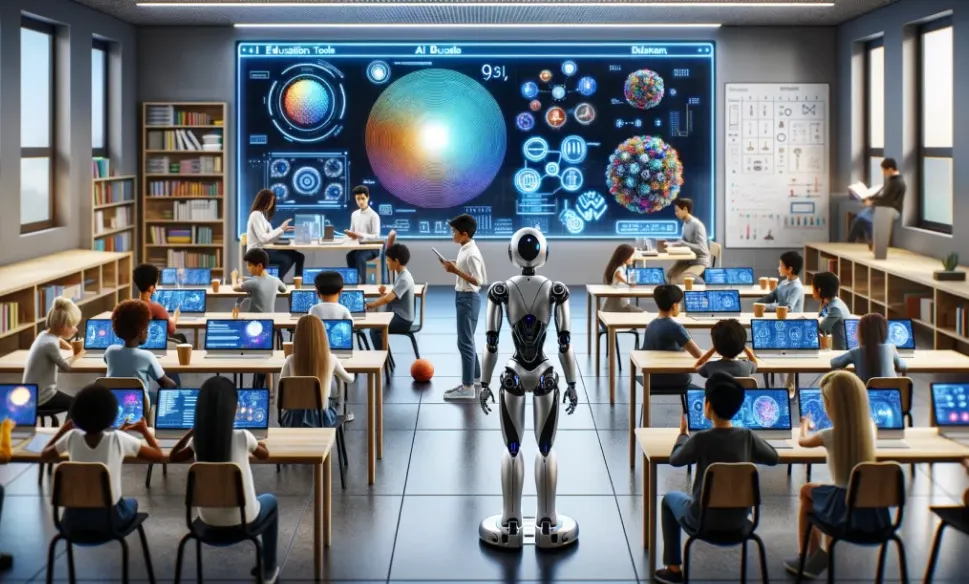Artificial Intelligence (AI) has emerged as a transformative force in almost every industry, and education is no exception. By 2024, AI technologies have revolutionized classrooms, reshaping how students learn, how teachers teach, and how educational systems operate. From personalized learning experiences to intelligent tutoring systems, the integration of AI is creating a more efficient, inclusive, and engaging educational environment. This article explores the ways in which AI is transforming education in 2024, highlighting its benefits, challenges, and potential future developments.
Personalized Learning: A Game Changer for Students
One of the most significant contributions of AI in education is personalized learning. Traditional classrooms often follow a one-size-fits-all approach, which can leave some students behind while others are not sufficiently challenged. AI-powered tools in 2024 are addressing this issue by tailoring educational experiences to individual needs.
Through adaptive learning platforms, AI analyzes a student’s performance, learning style, and pace. Based on this data, it provides customized lessons, exercises, and feedback. For example, a student struggling with algebra can receive targeted exercises and explanations, while a gifted student can explore advanced topics at their own pace. This personalization not only enhances learning outcomes but also fosters a sense of autonomy and motivation among students.
Intelligent Tutoring Systems: 24/7 Support for Learners
In 2024, AI-driven intelligent tutoring systems (ITS) are playing a crucial role in providing round-the-clock assistance to students. These systems, powered by natural language processing and machine learning, simulate human tutors by answering questions, explaining concepts, and offering practice problems.
ITS platforms like ScribeAI and LearnSmart are being widely adopted in schools and universities. They provide instant feedback, identify gaps in understanding, and adapt their responses to match the student’s level of knowledge. This constant availability ensures that students can receive support outside traditional classroom hours, making learning more flexible and accessible.
AI-Powered Assessment Tools: Reducing Teacher Workload
Assessments are an integral part of education, but they can be time-consuming for educators. AI-powered tools in 2024 are automating the grading process, freeing up teachers to focus on instructional activities. These tools can assess multiple-choice questions, essays, and even creative projects with remarkable accuracy.
For instance, AI algorithms can analyze written responses for grammar, coherence, and relevance, providing detailed feedback to students. This automation not only speeds up the grading process but also ensures consistency and reduces biases in evaluation.
Enhanced Classroom Management
AI is streamlining classroom management through tools that help teachers monitor student engagement and manage administrative tasks. In 2024, AI systems equipped with facial recognition and behavioral analysis can detect when students are distracted or struggling. Teachers receive real-time alerts, enabling them to address issues promptly.
Additionally, AI-driven administrative platforms are handling tasks such as scheduling, attendance tracking, and resource allocation. This reduces the burden on educators, allowing them to dedicate more time to teaching and mentoring students.
Breaking Language Barriers with AI Translation
Language barriers have long been a challenge in diverse classrooms. AI-powered translation tools like Google Translate and DeepL have evolved significantly by 2024, enabling seamless communication between students and teachers from different linguistic backgrounds.
These tools can transcribe and translate lectures in real time, allowing non-native speakers to fully participate in class activities. Moreover, AI is helping students learn new languages through interactive apps that use gamification, speech recognition, and personalized feedback.
Fostering Inclusive Education
Inclusivity is a cornerstone of modern education, and AI is making significant strides in supporting students with diverse needs. In 2024, AI-powered assistive technologies are empowering students with disabilities to access education more effectively.
For example, AI-driven speech-to-text tools are helping students with hearing impairments, while text-to-speech applications are assisting those with visual impairments. Adaptive keyboards and eye-tracking systems enable students with physical disabilities to interact with digital content. These innovations are leveling the playing field and ensuring that every student has an equal opportunity to succeed.
VR and AR Integration: Immersive Learning Experiences
Virtual reality (VR) and augmented reality (AR), powered by AI, are transforming how subjects are taught in 2024. These technologies provide immersive and interactive learning experiences that make abstract concepts tangible and engaging.
For instance, students can explore ancient civilizations through virtual field trips or conduct complex scientific experiments in a simulated lab environment. AI algorithms enhance these experiences by adapting the content to the learner’s proficiency level and interests. This combination of AI, VR, and AR is revolutionizing STEM education, history lessons, and more.
AI in Teacher Training and Professional Development
Teachers are also benefiting from AI through enhanced training and professional development opportunities. AI-powered platforms in 2024 analyze classroom interactions and provide actionable feedback to educators, helping them refine their teaching methods.
For example, AI can evaluate a teacher’s delivery style, engagement techniques, and use of instructional materials. It then offers suggestions for improvement, such as incorporating more interactive elements or adjusting the pacing of lessons. These insights enable teachers to continuously improve and adapt to the evolving needs of their students.
Ethical Considerations and Challenges
Despite its numerous benefits, the integration of AI in education comes with challenges and ethical considerations. Privacy concerns are at the forefront, as AI systems often collect and analyze vast amounts of student data. Ensuring the security and confidentiality of this information is critical.
Additionally, there is a risk of over-reliance on AI, which could undermine the human element of education. Teachers play a vital role in fostering empathy, critical thinking, and social skills—qualities that AI cannot replicate. Striking a balance between AI and human involvement is essential to maintain the integrity of education.
Bridging the Digital Divide
While AI has the potential to democratize education, it also highlights the digital divide. Not all schools and students have access to the advanced technologies required to implement AI-based solutions. Addressing this disparity is crucial to ensure equitable access to the benefits of AI in education.
Governments and organizations in 2024 are investing in infrastructure, funding, and training programs to bridge this gap. Initiatives such as providing low-cost devices, expanding internet connectivity, and offering free AI-powered learning platforms are helping to level the playing field.
Future Prospects: The Next Frontier in AI Education
Looking ahead, the role of AI in education will continue to evolve. By 2030, we can expect even more sophisticated AI applications, such as emotion-aware AI that detects student emotions and tailors interactions accordingly. Collaborative AI platforms may enable students and teachers from around the world to work together on projects, fostering global learning communities.
AI-driven predictive analytics could also play a significant role in identifying students at risk of falling behind and providing timely interventions. These advancements have the potential to create a truly transformative educational experience, preparing students for a rapidly changing world.
Conclusion
In 2024, artificial intelligence is revolutionizing classrooms by making education more personalized, inclusive, and efficient. From intelligent tutoring systems to immersive learning experiences, AI is empowering students and teachers alike. While challenges such as ethical considerations and the digital divide remain, the potential of AI to reshape education is undeniable. As we continue to explore and refine these technologies, the future of learning looks brighter than ever, with AI at the helm of innovation


